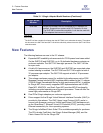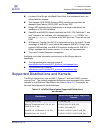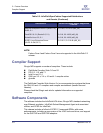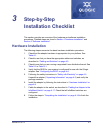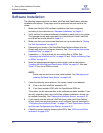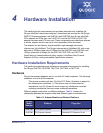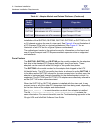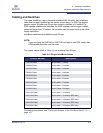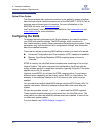
3 – Step-by-Step Installation Checklist
Software Installation
3-2 IB0056101-00 G
S
Software Installation
The following steps summarize the basic InfiniPath and OpenFabrics software
installation and startup. These steps must be performed on each node in the
cluster:
1. Make sure that the HCA hardware installation has been completed
according to the instructions in “Hardware Installation” on page 4-1.
2. Verify that the Linux kernel software is installed on each node in the cluster.
The required kernels and supported Linux distributions for both InfiniPath
and OpenFabrics are defined in Table 5-1.
3. Make sure that your environment has been set up as described in “Setting
Up Your Environment” on page 5-2.
4. Download your version of the InfiniPath/OpenFabrics software from the
QLogic web site to a local server directory. See “Choosing the Appropriate
Download Files” on page 5-3.
5. Unpack the tar file and check for any missing files or RPMs. See
“Unpacking the InfiniPath tar File” on page 5-4 and “Check for Missing Files
or RPMs” on page 5-5.
6. Install the appropriate packages on each cluster node as described in
“Installing the InfiniPath and OpenFabrics RPMs” on page 5-6. Also see
Table 5-4 for a list of RPMs to install.
7. Under the following circumstances, the system needs to be rebooted:
If this is the first InfiniPath installation OR
If you have installed VNIC with the OpenFabrics RPM set
The system can be rebooted after all the software has been installed. If you
are only upgrading from a prior InfiniPath software installation, drivers can
be restarted manually. See “Starting the InfiniPath Service” on page 5-10.
8. If you want to use the optional InfiniPath (ipath_ether) and OpenFabrics
drivers (ipoib) and services (opensm, srp), configure them as described in
“Configuring the InfiniPath Drivers” on page 5-11 and “OpenFabrics Drivers
and Services Configuration and Startup” on page 5-16.
9. Check the system state by observing the LEDs. See “LED Link and Data
Indicators” on page 5-29.
NOTE:
Rocks may be used as a cluster install method. See “Managing and
Installing Software Using Rocks” on page 5-36.





